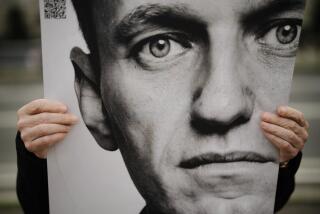Britain accuses Russian of poisoning ex-KGB spy
- Share via
LONDON — A millionaire businessman who once worked in the Russian secret services has been accused in connection with the radiation poisoning of former KGB agent Alexander Litvinenko, opening the door to a chilly new diplomatic standoff between Britain and Russia.
British authorities said Tuesday that they would seek to extradite Andrei Lugovoy, a former elite KGB agent, and charge him with murder.
“I have concluded that the evidence sent to us by the police is sufficient to charge Andrei Lugovoy with the murder of Mr. Litvinenko by deliberate poisoning,” Ken Macdonald, head of public prosecutions, told reporters.
A former agent in the Kremlin guard, Lugovoy has been a key figure in the international drama of wealth, crime and politics that has sullied relations between London and Moscow.
Litvinenko, a Russian dissident and former KGB agent who had written about Russia’s seamy intelligence underworld, died in November after ingesting a massive dose of radioactive polonium-210. Traces of the isotope were found in at least 10 locations around London, including a hotel bar and soccer stadium.
Authorities in Moscow said the Russian Constitution prohibited the extradition of Russian citizens, but they did not rule out the possibility of a trial in Russia.
“A Russian citizen who has committed a crime on the territory of a foreign state should be prosecuted in Russia with evidence provided by the foreign state,” Marina Gridneva, spokeswoman for the prosecutor general’s office, told reporters.
She said Russian authorities would study “in detail” the British charges in connection with their own investigation of Litvinenko’s death.
*
‘Not a simple murder’
Friends of Litvinenko predicted the case would eventually implicate the government of Russian President Vladimir V. Putin.
“It is absolutely clear to everyone who has spent time looking at this case that this was not done by just one single person. This is not a simple murder,” said Yuri Felshtinsky, who wrote a book with Litvinenko about purported crimes committed by the Russian secret services.
“I think realistically they must discuss the possibility of sanctions against the Russian government -- diplomatic and political sanctions,” Felshtinsky said.
The expected tug of war over Lugovoy could further strain relations between the two former Cold War adversaries. Britain’s policy of sheltering Russian dissidents has long irked Moscow, which has attempted to extradite two associates of Litvinenko who have obtained political asylum in Britain.
“This was a serious crime. We are seeking and expect full cooperation from the Russian authorities in bringing the perpetrator to face British justice,” Foreign Secretary Margaret Beckett said. She said that message was “made strongly” to the Russian ambassador, who was summoned to the Foreign Office on Tuesday.
The official spokesman for Prime Minister Tony Blair, briefing reporters under standard conditions of anonymity, said Britain’s need to maintain open diplomatic channels with Russia “doesn’t in any way obviate ... the need for the international rule of law to be respected.”
He added: “Nobody should be under any doubt as to the seriousness with which we are taking this case. Murder is murder.”
Lugovoy, whose business endeavors include cider making and security consulting, was one of the last people to meet with Litvinenko before he fell ill in November. The two shared drinks in a hotel bar in the heart of London’s upscale Mayfair district, where substantial traces of polonium-210 were later found.
Not long after the meeting, Litvinenko became gravely ill. Once hospitalized, he grew gaunt, lost his hair and suffered paralyzing pain as the radioactive isotope attacked his internal organs. He died about three weeks later, leaving behind a letter accusing Putin of being responsible for his death.
Lugovoy has said he was discussing potential business opportunities with Litvinenko and was himself exposed to the polonium as a result of his contact with his former KGB colleague.
“I have never had either objective or subjective motives for committing what London is accusing me of.... I have always believed that the British justice system would be above this sort of conjecture,” Lugovoy told state-owned Rossiya television in Moscow.
*
Link to tycoon
Lugovoy headed the security detail of former Russian Prime Minister Yegor T. Gaidar in the 1990s, then left the KGB and became head of security for a Russian television network owned by tycoon Boris Berezovsky.
Berezovsky later was granted asylum in Britain, where he set up an opposition-in-exile. He maintained contacts with both Litvinenko, who occasionally worked for him, and Lugovoy, whose company was in charge of security for members of Berezovsky’s family as recently as November, according to a report from the Litvinenko Justice Foundation, which is funded by Berezovsky.
Friends and family members of Litvinenko have said the use of polonium-210 suggests high-level government involvement. The vast majority of the isotope is manufactured at a secret government plant near the Russian city of Samara.
“Now, first of all, they stand accused in the eyes of public opinion. Because every reasonable person knows this was a state-sponsored job,” said Alex Goldfarb, a longtime friend of Litvinenko who wrote a book about his death with Litvinenko’s widow, Marina.
Marina Litvinenko met with Russia’s ambassador to Britain on Tuesday at the Russian Embassy’s request.
“The Russian ambassador stated to me that the Russian government’s reputation has been damaged by the comment surrounding the murder of my husband. I suggested that the best way to restore Russia’s reputation would be to cooperate fully with the extradition request. This would prove there wasn’t state involvement,” she said in a statement after the meeting.
“It is important to me that my husband didn’t die in vain, and that the perpetrators of his murder are brought to justice in the UK.”
*
Times staff writers Sergei L. Loiko and David Holley in Moscow and Alicia Lozano in London contributed to this report.
*
(BEGIN TEXT OF INFOBOX)
A fateful drink?
British authorities accuse Russian businessman Andrei Lugovoy of killing former KGB agent Alexander Litvinenko.
Alexander Litvinenko
Died Nov. 23 of radiation poisoning from polonium-210. Litvinenko had been investigating the Oct. 7 shooting death of Russian journalist Anna Politkovskaya.
Andrei Lugovoy
Private security consultant and former KGB agent was one of the last people to meet with Litvinenko before he fell ill. They had drinks at an upscale London hotel.
Source: Times staff and wire reports. Graphics reporting by Julie Sheer.
More to Read
Sign up for Essential California
The most important California stories and recommendations in your inbox every morning.
You may occasionally receive promotional content from the Los Angeles Times.










